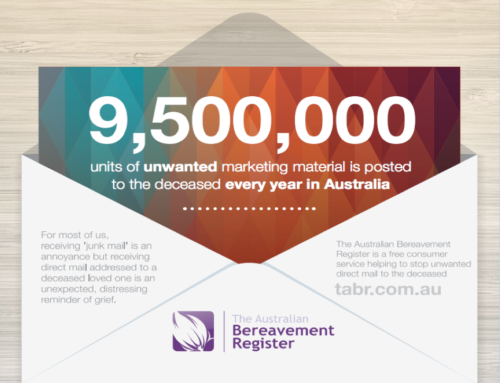‘Stop dead letters’ is the clear shout out from The Australian Bereavement Register (TABR) in the lead up to Christmas.
At a time when direct marketing is at fever pitch, the Register has launched a national campaign to raise awareness of the heartache felt by families and the catastrophic environmental impact caused by marketers sending 1.7 million ‘dead letters’ to the deceased from October through December.
Managing Director of TABR, Glenn Harrison says: “On average, a deceased person receives 68 items of direct mail during the first year following their death. With upwards of 140,000 people dying annually in Australia, this amounts to a staggering 9.5 million pieces of unnecessary direct mail every year ending up in suburban bins around the country.”
Having learnt from a personal experience after a colleague’s sudden death, TABR was founded in order to stop bereaved families being bombarded with unwanted mail. Now with 420,000 names on the register and attracting the support of major hospital, government and industry partners, the innovative service offers families a free, one-contact service to remove their loved one from direct mailing lists. Companies fund the register when they wash their mail out lists with TABR to ensure their data is effective and up-to-date.
With the welfare of bereaved families the priority, Harrison said it didn’t take us long to realise the massive environmental impact of these dead letters. “(As a company) this has become more and more evident to us over time and we feel compelled to share this knowledge and stop it,” he says.
TABR is working closely with environmental partners to encourage businesses and charity organisations with high volume direct marketing to get on board and take the first step to reducing their waste.
As Planet Ark’s Corporate Development and Marketing Manager, Freya Paterson says: “registering with the Australian Bereavement Register can help reduce unnecessary waste and use of resources while assisting grieving families. On average, each tonne of paper removed from commercial correspondence saves 18 trees, 167,500 litres of water and 3,300 kg of greenhouse gas emissions.
“The bereavement register makes it much easier for marketers to avoid causing unnecessary pain for grieving families. The register will also help reduce waste of print and paper costs, not to mention the huge amounts of money and energy used in postage.
“For direct mail marketers and fundraisers, any data that can help you refine your database is incredibly valuable, and drawing on the bereavement register will support the community in so many ways.”
According to Harrison, Australia has become one of the worst offenders in producing dead letters.
“As a nation we are well behind the rest of the world in data cleansing. Only 30% of companies are pre screening their data to remove names of the deceased on a regular basis compared to 70% in the US and UK/Europe. The resulting unnecessary mail amounts to a conservative loss of $17 million to businesses each year in production costs alone. There are simply no winners here. There is the family loss, the financial loss, and the environmental loss. We should be leading in this space, reducing landfill and showing other countries how it is done, by reducing shameful landfill.”











